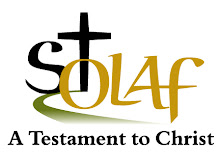September 19, 2010 (Serving God)
Reading I: Amos 8:4–7 (The Lord Doesn’t Forget); Reading II: 1 Timothy 2:1–8 (One God); Gospel: Luke 16:1–13 (Serving One Master)
Adults: How often do I speak for justice or act with generosity?
Children: When do I have a chance to make sure that others are treated fairly?
Reading 1: Families might want to sit down and discuss whether the activities they do or the things they buy reflect their true values. Some families struggle to have enough. "Doing without" is a way of life. Some families who have enough, or more than enough, try to share with those who have less. Take a look at your possessions. How might you share some of them with those who have less? What other ways can you share your "time, talent, and treasure" with those who struggle just to have enough?
Reading 2: This letter states that the men "shall offer prayers with blameless hands held aloft."
This gives us an idea of the way these early Christians prayed. We can pray sitting, standing, or kneeling. We can pray with our hands folded or held "aloft"?usually palms up. In the Jewish religion and in the early Church, men (and women) prayed while standing. The Mass was offered while standing. Even sermons or homilies were given while people stood. (Saint Augustine apologizes for the length of his sermons, as he knows people are standing as they listen to him.) This custom of standing in prayer is kept today in many parishes of the Eastern Church. In the Roman Catholic Church, kneeling was introduced as a practice of penance by the Irish monks. This practice later spread to other places, including the United States. How do you like to pray? Why? Do you remember to pray for those leaders whose decisions affect our nation's values? Gospel: What "riches" do you have and how do you use them? How do you share your money with those who have less? How do you use your money to care for yourself? How do you use your money to care for others?
GIFT Snow Day!
14 years ago


No comments:
Post a Comment